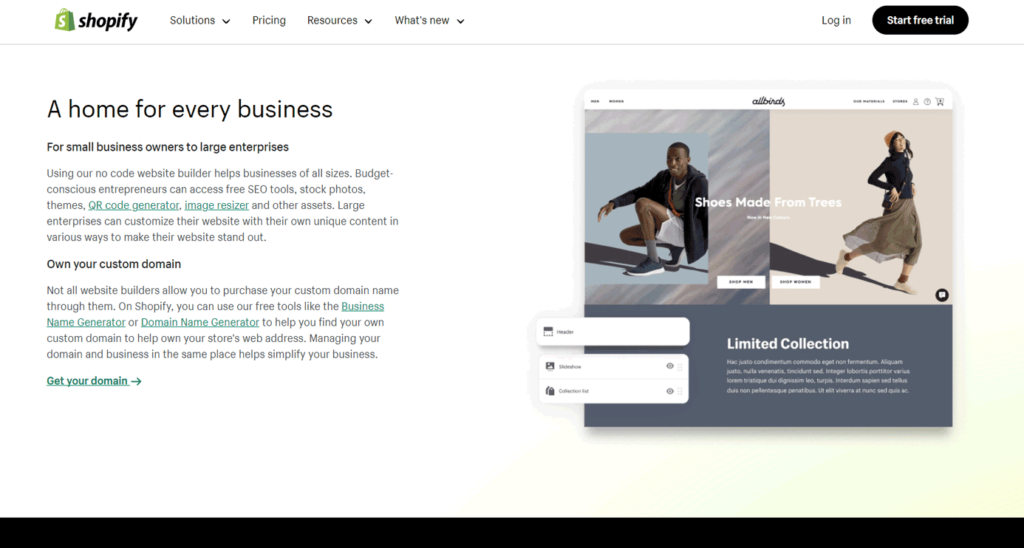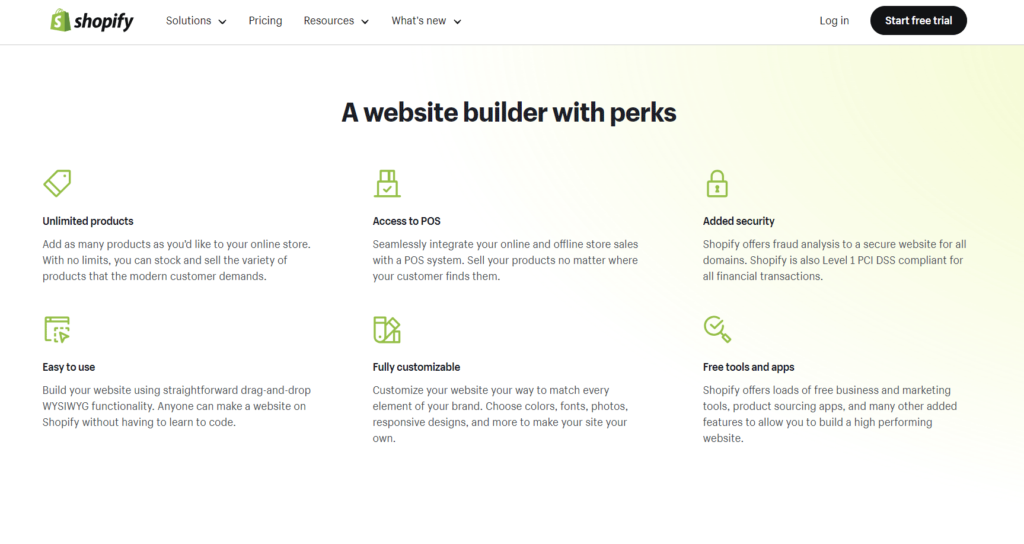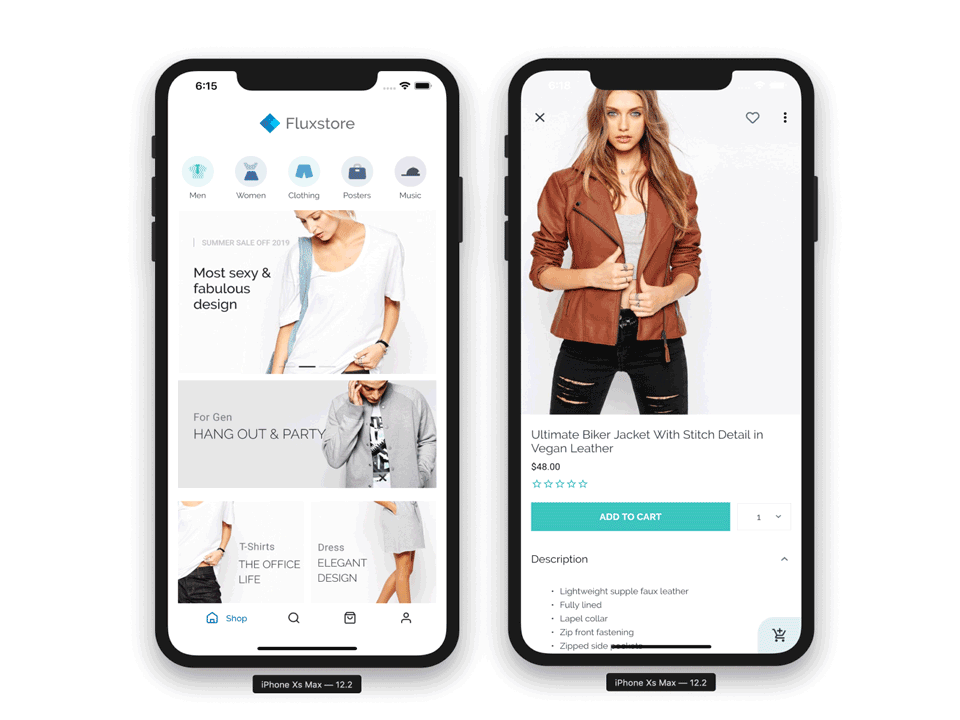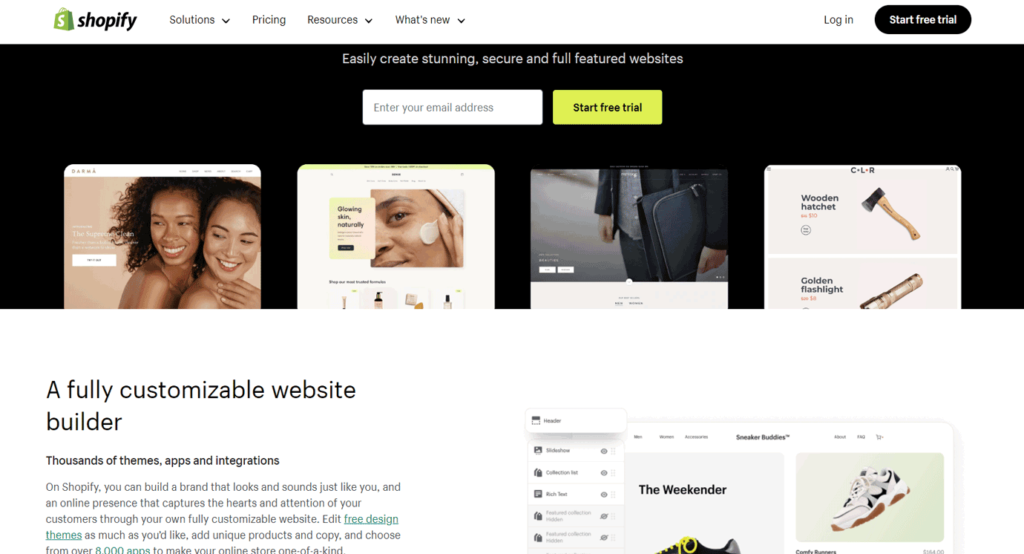Table of Contents
Our Verdict
Shopify stands out as a leading and user-friendly e-commerce platform in the current market. Boasting powerful functionalities, stunning templates, and extensive support, Shopify simplifies the process of establishing an online store and commencing sales.
The verdict states that Shopify is the best overall platform for ecommerce if you’re a beginner, small business owner, or a high-volume merchant alike. It offers unmatched scalability, allowing your business to grow with the platform. Shopify also enables you to sell across multiple channels, including your own online store, brick-and-mortar locations, social media, and online marketplaces.
While Shopify excels in many areas, it does have some drawbacks to consider. The monthly fees can add up quickly once you factor in transaction fees and app costs. Shopify also relies heavily on apps to unlock certain functionalities that competitors include as standard features. And customizing the platform beyond surface-level design tweaks requires advanced coding skills.
Overall, Shopify’s ease of use, extensive features, and flexibility make it our top choice for building an online business. Its vibrant app ecosystem allows endless possibilities for enhancing your store. Are you serious about ecommerce? Shopify remains a premium solution!
Pros
- Has User-friendly dashboard and template-driven design for easy store setup
- Functions a robust built-in ecommerce functionality for payments, shipping, inventory, etc
- Adds large app store with extensions for additional features
- Incurs automated tax calculations and shipping rate options
- Allows you to sell across multiple sales channels
- Integrates with major shipping carriers for label printing and tracking
- Includes abandoned cart recovery and other selling tools
- Offers a range of plan options with scalable features
- Provides 24/7 customer support
Cons
- Incurs transaction fees on top of monthly subscription fees
- Use apps and some features with extra costs
- Lacks ability to customize site design and code
- Controls and limits API access
- Use Shopify payments as payment gateway on basic plans
- Stores customer data storage with restriction
- Has complex initial setup for beginners
- Lacks ability to migrate to a self-hosted cart later
MORE >>> DreamHost Website Builder Review
Who Shopify Is Best For
Shopify is an excellent choice for entrepreneurs and small business owners like you who are looking to create a professional online store without modern technical skills. Key users who can benefit most from Shopify include people who:
- Stand as ecommerce beginners
- Own smaller product catalogs
- Have busy schedules
- Control creative brands
- Operate as service selling
- Command multi-channel sells
- Dominate the international market
- Operate high-volume services
Who Shopify Isn’t Right For
While Shopify works for most types of internet sellers, it may not be the best choice in certain situations including of you:
- Function as an advanced developer
- Manage enterprise ecommerce
- Possess centralized inventory
- Experience high-risk product verticals
- Own 3D/configurable products
- Deal in video/media services
- Have physical products requiring warehouse integration
- Depend on highly customized code
What Shopify Offers

As a fully hosted all-in-one ecommerce platform, Shopify handles everything from store setup to secure checkout in one seamless system. Here’s an overview of Shopify’s core offerings:
Provides Store Setup and Management
Shopify makes launching an online store simple, with an intuitive drag-and-drop store builder and hundreds of professional themes. Managing products, inventory, and orders is streamlined from one central dashboard.
Allows Multiple Sales Channels
In addition to your main Shopify online store, the platform allows you to easily sell across social media, online marketplaces, brick-and-mortar locations, and more.
Handles Checkout and Payments
Shopify offers a high-converting optimized checkout process and facilitates secure payments through Shopify Payments or over 100 third-party payment gateways.
Automates Shipping and Fulfillment
Automate shipping rates, print labels, and integrate with fulfillment services to simplify delivering orders from your Shopify store.
Enhances Marketing and Promotions
Built-in marketing tools like email marketing, coupons, gift cards, and abandoned cart recovery help you attract and retain buyers.
Incurs Reporting and Analytics
Shopify provides detailed reports on sales, traffic, conversion rates, bestsellers, marketing ROI, and more to track your business’s performance.
Offers App Ecosystem
The Shopify App Store gives you access to thousands of apps to extend your store’s functionality, from accounting to SEO to customer service.
Gives Shopify POS
Shopify’s POS system lets you sell your Shopify products and inventory across brick-and-mortar and pop-up locations in a seamless omnichannel experience.
Provides 24/7 Support
Shopify offers around-the-clock technical support via live chat, email, and phone to quickly resolve issues and questions.
Shopify Details
Now that you have an overview, explore some of Shopify’s key features and functionality in more detail:
Offers Easy-to-use Store Building
Shopify offers an intuitive drag-and-drop store builder for quickly creating an optimized online store. Simply choose from over 100 designer themes and customize the design with your branding.
Themes are professionally designed and mobile-optimized. Paid themes range from $140-$180. While you can fully customize theme templates and code, the core files can’t be edited.
The page builder uses easy drag-and-drop sections. However, you still edit text and images on the page itself rather than moving elements directly. Shopify’s WYSIWYG editor simplifies adding and formatting text.
Handles Products and Inventory
Managing products and inventory in Shopify is simple thanks to bulk editing capabilities. You can categorized products, create unlimited variants, add rich descriptions, and manually or automatically adjust inventory counts.
However, Shopify limits product variants to a maximum of 100 options per product. Each variant can only include up to 3 options (like size, color, material). Apps allow removing these restrictions.
Deals with Checkout and Payments
Shopify offers a high-converting optimized checkout designed to minimize cart abandonment. You can customize the checkout design and branding and add custom fields or surveys if needed.
The Shopify payments integration provides a simplified checkout experience for buyers and consolidated reporting for sellers. No transaction fees apply when using Shopify Payments, unless you’re on the starter plan.
Shopify Payments supports over 45 major payment methods. You can also integrate over 100 third-party payment gateways like PayPal, Stripe, and Square, but these incur additional transaction fees.
Sustains Shipping and Taxes
Configuring shipping rules and rates is straightforward in Shopify. Options include weight-based rates, free shipping thresholds, and flat-rate shipping. You can even offer local pickup.
Shopify Shipping provides discounted USPS, DHL, and UPS rates. But real-time calculated shipping with top carriers requires an Advanced plan, limiting dynamic shipping rate options on lower-priced plans.
Supports Marketing and Promotions
Shopify comes equipped with several built-in marketing features to help you promote products and engage customers.
These include an email marketing tool for sending bulk emails and newsletters, built-in coupons, automatic abandoned cart recovery, gift cards, customer groups for targeted marketing, and SEO optimization.
In addition, detailed sales and analytics reports provide data-backed insights to refine your marketing initiatives. You can also integrate SMTP email marketing services, push notifications, social media ad campaigns, and other marketing tools.
Renders App Ecosystem
Beyond its core features, Shopify offers an extensive app store with over 6,500 apps to add advanced and customized functionality to your online store.
Apps extend capabilities related to payments, marketing, customer service, accounting, shipping, SEO, international selling, inventory management, and more. Both free and paid apps are available.
Brings on Shopify POS
Shopify POS allows Shopify stores to easily sell in-person and integrate online and offline sales. Sell at brick-and-mortar stores, pop-ups, markets, and mobile locations using Shopify POS.
The Shopify POS app works on both iPad and iPhone. Shopify POS Go is a new dedicated handheld device for accepting in-person payments. Both integrate seamlessly with your online store’s inventory counts and reporting.
Addresses Support and Community
Shopify offers 24/7 support via live chat, email, phone, and online documentation and tutorials. Support reps are friendly and knowledgeable. Priority support is also available for Plus plan users.
PRO TIPS >>> How to Choose a Website Builder
Where Shopify Stands Out

After reviewing all of Shopify’s capabilities and testing the platform extensively, a few key strengths really stand out that give Shopify an edge over competitors:
Controls Ease of Use
Shopify earns top marks for its user-friendly admin and intuitive store management workflow. The dashboard neatly organizes all store management tasks in one place.
Detailed setup tutorials, simplified editor interfaces, and step-by-step guidance make it simple for novices to launch a professional online store quickly with minimal learning curve. The platform prevents you from needing advanced coding skills or design expertise.
Equips Design Flexibility
Shopify offers unmatched design flexibility compared to other ecommerce platforms. You can choose from over 100 designer themes to instantly apply professional visual design to your shop.
You can also build a 100% custom store design from scratch using Shopify Sections for endless creative freedom. Add custom CSS/HTML and integrate web fonts for unlimited personalization.
Executes Scalability
One of Shopify’s biggest advantages is its unmatched scalability. The platform can grow smoothly alongside your business. All plans support unlimited bandwidth and products.
Features like Shopify Flow automate workflows as you scale order volumes. Shopify Plus provides customized enterprise-grade support, solutions, and integrations for high-volume merchants processing over $1 million annually.
Contracts App Integration
Shopify’s app store offers over 6,500 apps, providing the ability to enhance your store’s capabilities in endless ways. Shopify has one of the most robust and highest-quality app ecosystems among ecommerce platforms.
You can use apps to add features like subscription recurring billing, custom designs, advanced reporting, automated marketing, personalized customer communication, and more. New apps release constantly to expand what’s possible.
Allows Checkout Optimization
Shopify invests heavily in its checkout user experience to maximize conversion rates. The optimized one-page responsive checkout design removes unnecessary friction and distractions.
Your customers can check out quickly using Shop Pay, Shopify’s accelerated checkout system. Automatic form completion and Apple/Google Pay integration further expedite checkout.
Fraud analysis tools, custom checkout field options, and seamless Shopify Payments integration provide a secure, trustworthy buying process.
Permits Omnichannel Selling
Shopify provides unmatched omnichannel sales capabilities compared to other ecommerce platforms. The unified backend connects your online store and brick-and-mortar sales channels via Shopify POS.
Sell across online and physical locations while keeping inventory, orders, and customer data synchronized in real time. Shopify also facilitates selling through social media, messaging apps, online marketplaces, and more from one dashboard.
Where Shopify Falls Short
Despite Shopify’s numerous strengths, there are a few key areas for improvement that should be considered:
- Restricts creativity by forcing you to work within template structures
- Relies on third-party apps for advanced functions like returns and accounting instead of building these features natively
- Limits developers’ customization abilities at code level with closed-source system
- Hides extra fees for add-ons like tax automation, shipping discounts, and plugins that can add up. Budget for these hidden costs.
- Lacks optimization like advanced anti-fraud protections, alternate payment options, and cross-border order capabilities compared to dedicated solutions.
- Fails to match sophisticated solutions like Google Analytics 360 and Adobe Analytics with basic built-in reporting and analytics
How to Sign Up for Shopify

- Sign up for shopify
- Choose a plan
- Purchase domain
- Select a theme
- Customize your store
- Add products
- Set up payments
- Configure shipping
- Launch your store
- Market your Shopify store
GET SMARTER >>> Best Website Builders for Responsive Design
Alternatives to Shopify
Shopify is the best overall hosted ecommerce platform for most online sellers. However, here are some top Shopify alternatives to also consider for your business:
- WooCommerce: Open-source WordPress plugin for DIY stores. Extremely customizable but requires self-hosting and more technical skill.
- Squarespace: Simpler all-in-one platform better for blogs and content marketing over advanced product management.
- BigCommerce: Top enterprise-level SaaS platform with built-in features to rival Shopify.
- Wix: Robust free plan and ADI product building assistant makes Wix better for ecommerce beginners.
- Etsy: Best marketplace for selling handmade, vintage, and craft products directly to your buyers.
- Magento: Open-source heavy-hitter powers over 250,000 stores but has a steep learning curve.
- Weebly: Easy drag-and-drop builder but ecommerce features are light compared to true platforms.
Customer Reviews
Customer reviews of Shopify praise its user-friendly interface, diverse templates, and an array of sales features, resulting in widespread positive feedback across various platforms:
- Forbes ADVISOR rates it 4.5
- GetApp also rates it at 4.5
- Website Builder Expert gives it a 4.8 rating
- Nerd Wallet rates it at 4
Pro Tips
Follow these expert tips to maximize success when using Shopify:- Start with the cheapest plan then scale up later as your store grows. Extra features often aren’t worth the added cost early on.
- Use Shopify’s free trial to test drive the platform before committing. Get a feel for the interface and capabilities.
- Take advantage of the discounted monthly rates that come with paying annually vs month-to-month.
- Use Shopify payments unless you already have an established payment provider you need to integrate. Avoid extra transaction fees.
- Carefully research apps before installing to ensure they integrate smoothly and provide the exact features you need.
- Install essential apps right away during initial store setup to avoid having to reconfigure things later.
- Take the time to properly organize your products into collections and categories for better buyer navigation.
- Leverage Shopify’s design flexibility to create a store aligned with your branding, not locked to rigid templates.
- Use Shopify POS hardware to unlock new sales avenues in physical retail locations and at local events.
Recap
In summary, Shopify remains the best overall end-to-end platform for creating scalable online stores with minimal technical know-how required. Both ecommerce experts and total beginners can get started selling faster with Shopify.
The platform shines with its hundreds of designer templates, robust checkout optimization, built-in support for omnichannel selling, top-tier security, and app ecosystem for limitless customization. Shopify handles the complexity behind the scenes to let entrepreneurs focus on growing their business.
Downsides like theme design restrictions, reliance on apps, and lack of deep control for advanced developers exist. But for most use cases, Shopify provides an unbeatable solution for launching and growing a serious ecommerce business.
The company’s track record of high-profile customers, extensive resources, and 24/7 customer support further instill confidence in the platform. While weighing alternatives like WooCommerce and BigCommerce, we recommend Shopify as the best overall investment for selling online.








